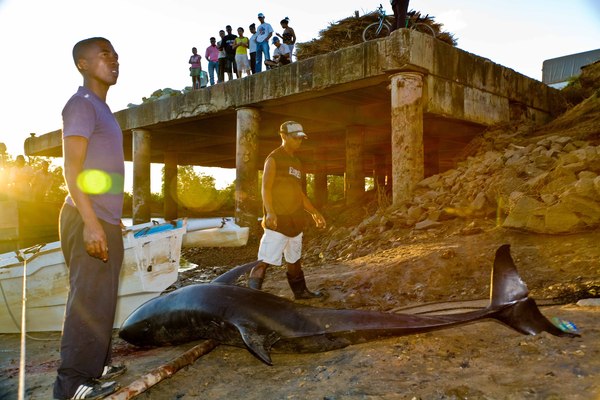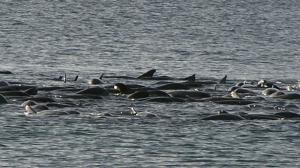Friday, September 27, 2013 1:31:53 AM
Mass Whale Stranding Proven to Be Caused by Sonar

Photo permission © International Fund for Animal Welfare (IFAW).
[;arger at http://images.huffingtonpost.com/2013-09-26-IFAW_Madagascar_5830sonar.jpg ]
By Candace Calloway Whiting
Marine mammal biologist
Posted: 09/26/2013 8:41 pm
A report [ http://iwc.int/index.php?cID=454&cType=html ] released yesterday by a panel of scientists, conservation organizations and government agencies have positively linked a mass stranding of whales to sonar used by Exxon/Mobile during an offshore survey. In this case, the whales fled the area prior to the seismic phase of the survey, which shows that even this type of sonar (also used by military and research vessels) is devastating to whale and dolphins.
The International Fund for Animal Welfare [ http://www.ifaw.org/united-states ] reports [ http://www.ifaw.org/united-states/news/whale-mass-stranding-attributed-sonar-mapping-first-time ]:
An independent scientific review panel has concluded that the mass stranding of approximately 100 melon-headed whales in the Loza Lagoon system in northwest Madagascar in 2008 was primarily triggered by acoustic stimuli, more specifically, a multi-beam echosounder system operated by a survey vessel contracted by ExxonMobil Exploration and Production (Northern Madagascar) Limited.
WCS and IFAW support these conclusions that add to a mounting body of evidence of the potential impacts of anthropogenic noise on marine mammals," said Dr. Howard Rosenbaum, Director of the Ocean Giants Program for WCS. "Implications go well beyond the hydrocarbon industry, as these sonar systems are widely used aboard military and research vessels for generating more precise bathymetry (underwater mapping). We now hope that these results will be used by industry, regulatory authorities, and others to minimize risks and to better protect marine life, especially marine mammal species that are particularly sensitive to increasing ocean noise from human activities.

Melon-headed whales swimming in tight circles in Hanalei Bay, Hawaii, on July 3, 2004.
(Image courtesy of National Oceanic & Atmospheric Administration)
While not conclusively proven, NOAA acknowledged a correlation with sonar in a similar mass stranding [ http://www.sciencedaily.com/releases/2006/04/060428094046.htm ] of melon-headed whales occurred in Hanalei Bay, Kauai, Hawaii in 2004. At the time of the stranding, the Navy was conducting exercises involving loud sonar in the area. "Sound propagation models suggest that sonar transmissions were likely detectable over a large area around Kaua'i for many hours on the day prior to the stranding, as well as within Hanalei Bay when the animals were there," said Brandon Southall, NOAA Fisheries Service's Acoustics Program Director. "Active sonar transmissions on the 2nd and 3rd of July are a plausible, if not likely, contributing factor to the animals entering and remaining in the bay."
The report comes at a time when there is considerable pressure from the oil industry to open up more areas for offshore seismic exploration, including the coastal U.S. and pristine arctic regions. In areas where the search for oil is underway whales and dolphins are beaching [ http://www.huffingtonpost.com/candace-calloway-whiting/whales-in-trouble_b_3901423.html ] regularly, and commercial fish populations can be reduced by half [ http://www.huffingtonpost.com/candace-calloway-whiting/offshore-oil-exploration-_b_3977171.html ].
This video [ http://www.youtube.com/watch?v=M4jC2tizy7w (below, as embedded)] shows the impact on whales and dolphins -- it is heartbreaking to see the pilot whale calf trying to communicate with its mother, and a bit alarming to learn how global this situation turns out to be.
Copyright © 2013 TheHuffingtonPost.com, Inc.
http://www.huffingtonpost.com/candace-calloway-whiting/whale-stranding-sonar_b_3997569.html [no comments yet]
--
Ocean noise cited in '08 whale mass stranding off the coast of Madagascar

The author examins a dead melon-headed whale in Madagascar.
09/26/2013

Photo permission © International Fund for Animal Welfare (IFAW).
[;arger at http://images.huffingtonpost.com/2013-09-26-IFAW_Madagascar_5830sonar.jpg ]
By Candace Calloway Whiting
Marine mammal biologist
Posted: 09/26/2013 8:41 pm
A report [ http://iwc.int/index.php?cID=454&cType=html ] released yesterday by a panel of scientists, conservation organizations and government agencies have positively linked a mass stranding of whales to sonar used by Exxon/Mobile during an offshore survey. In this case, the whales fled the area prior to the seismic phase of the survey, which shows that even this type of sonar (also used by military and research vessels) is devastating to whale and dolphins.
The International Fund for Animal Welfare [ http://www.ifaw.org/united-states ] reports [ http://www.ifaw.org/united-states/news/whale-mass-stranding-attributed-sonar-mapping-first-time ]:
An independent scientific review panel has concluded that the mass stranding of approximately 100 melon-headed whales in the Loza Lagoon system in northwest Madagascar in 2008 was primarily triggered by acoustic stimuli, more specifically, a multi-beam echosounder system operated by a survey vessel contracted by ExxonMobil Exploration and Production (Northern Madagascar) Limited.
WCS and IFAW support these conclusions that add to a mounting body of evidence of the potential impacts of anthropogenic noise on marine mammals," said Dr. Howard Rosenbaum, Director of the Ocean Giants Program for WCS. "Implications go well beyond the hydrocarbon industry, as these sonar systems are widely used aboard military and research vessels for generating more precise bathymetry (underwater mapping). We now hope that these results will be used by industry, regulatory authorities, and others to minimize risks and to better protect marine life, especially marine mammal species that are particularly sensitive to increasing ocean noise from human activities.

Melon-headed whales swimming in tight circles in Hanalei Bay, Hawaii, on July 3, 2004.
(Image courtesy of National Oceanic & Atmospheric Administration)
While not conclusively proven, NOAA acknowledged a correlation with sonar in a similar mass stranding [ http://www.sciencedaily.com/releases/2006/04/060428094046.htm ] of melon-headed whales occurred in Hanalei Bay, Kauai, Hawaii in 2004. At the time of the stranding, the Navy was conducting exercises involving loud sonar in the area. "Sound propagation models suggest that sonar transmissions were likely detectable over a large area around Kaua'i for many hours on the day prior to the stranding, as well as within Hanalei Bay when the animals were there," said Brandon Southall, NOAA Fisheries Service's Acoustics Program Director. "Active sonar transmissions on the 2nd and 3rd of July are a plausible, if not likely, contributing factor to the animals entering and remaining in the bay."
The report comes at a time when there is considerable pressure from the oil industry to open up more areas for offshore seismic exploration, including the coastal U.S. and pristine arctic regions. In areas where the search for oil is underway whales and dolphins are beaching [ http://www.huffingtonpost.com/candace-calloway-whiting/whales-in-trouble_b_3901423.html ] regularly, and commercial fish populations can be reduced by half [ http://www.huffingtonpost.com/candace-calloway-whiting/offshore-oil-exploration-_b_3977171.html ].
This video [ http://www.youtube.com/watch?v=M4jC2tizy7w (below, as embedded)] shows the impact on whales and dolphins -- it is heartbreaking to see the pilot whale calf trying to communicate with its mother, and a bit alarming to learn how global this situation turns out to be.
Copyright © 2013 TheHuffingtonPost.com, Inc.
http://www.huffingtonpost.com/candace-calloway-whiting/whale-stranding-sonar_b_3997569.html [no comments yet]
--
Ocean noise cited in '08 whale mass stranding off the coast of Madagascar

The author examins a dead melon-headed whale in Madagascar.
09/26/2013
http://www.ifaw.org/united-states/news/ocean-noise-cited [the YouTube, http://www.youtube.com/watch?v=cHuqYcKZoDg , embedded; no comments yet]
Join the InvestorsHub Community
Register for free to join our community of investors and share your ideas. You will also get access to streaming quotes, interactive charts, trades, portfolio, live options flow and more tools.







